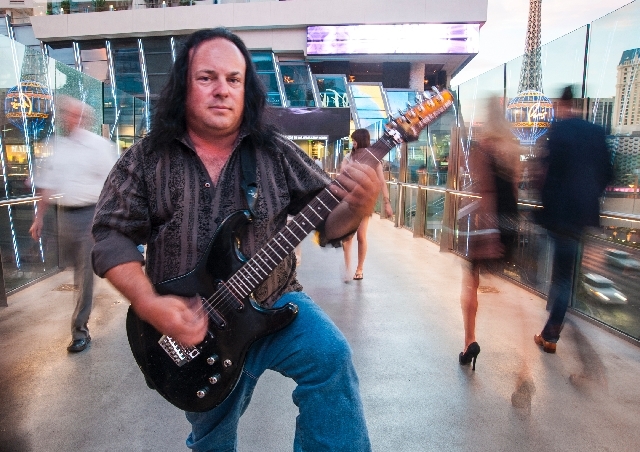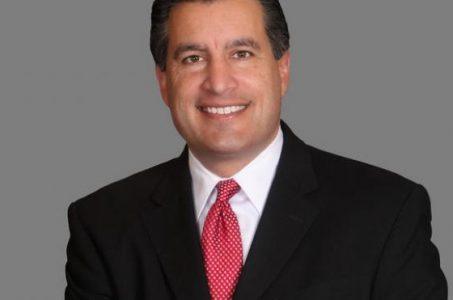Las Vegas Street Performer Challenges for Right to Entertain
Posted on: August 8, 2013, 05:30h.
Last updated on: October 26, 2021, 05:25h.

If you’ve ever been to Vegas, you’ve probably enjoyed the sights and sounds on the sprawling sidewalks outside the casinos as much as what goes on inside. Elvi in all their various crazy getups, superheros and one-man bands are but a few of the bizarre-to-fabulous entertainers who actually make their living as a kind of casino warm-up act for Las Vegas tourists. But it’s long been a tense dance between the civil rights of these performers, and the casinos’ desires to keep their sidewalks clear and easy-to-manuever pathways, and as such, one musician has taken on the fight.
Making Music
Michael T. Moore, a 46-year-old, out-of-work former union organizer, turned to street performing – playing heavy metal guitar riffs on various Strip locations, including some casino connective walking bridges – and it turned into a pretty lucrative cash gig for him, sometimes pulling in as much as $150 per night.
“It is a lot better than working 90 hours a week for a law firm or a union and being on the verge of a heart attack,” said Moore. “If I would have known street performing paid like this I would have done it 20 years ago.”
But the gig has now become an ongoing battle with Las Vegas’ Metro police force, who have twice not only cited Moore, but actually taken away his amplifiers. Now, Moore is taking the battle quite seriously as he fights for his street performing life. And so far, he appears to be winning. But appearances can be deceiving.
Moore challenged the citations in district court and the judge overruled the prosecutor’s objections, returning his amplifiers. Well, in theory, anyway. One week after the judge’s return order, Moore still didn’t have his musical equipment back in hand. Without it, he says, they’ve basically taken away his ability to make a living performing, on or off the Strip.
“There was no need to take the tools of my trade,” Moore said. “I have been unable to work for seven or eight weeks, I can’t even work away from the Strip.”
Commission Ordinances Behind It All
The issue all stems from a series of Clark County Commission ordinances aimed at cracking down on everything from unlicensed water bottle vendors frequently working tourists on the casino overpass bridges in hot weather to skateboarders weaving by at high speeds. Included in the ordinances are potential safety hazards like electrical cords and equipment. Not included, ironically, are the porn card-slamming distributors that have been almost universally cited as annoying and distasteful to pedestrian visitors; the Commission says they have no say because it involves “free speech.”
Technically, street performers are also allowed; just not the equipment that most would require to be heard above the general din that permeates the Strip, between the Bellagio fountains, the Mirage volcano, and more.
“The balance is keeping the Strip safe for visitors yet maintaining a fun environment for people who go there,” said Christopher Lalli, an assistant district attorney, who says Metro police are tasked with the difficult decisions of who is crossing the line.
This being America, no case is complete until the American Civil Liberties Union (ACLU) of Nevada gets involved, and Moore’s case already has Allen Lichtenstein, the ACLU’s general counsel, on the job. The attorney says police must prove the amps were throwing Moore’s sounds more than 75 feet for it to be valid for them to have taken them away.
“When you have all the sound coming out of the casinos and volcanoes and music going along with the dancing water, it is kind of difficult,” Lichtenstein said.
For Moore, it’s become a battle to maintain his performance lifestyle. “This is the way I’ve chosen to exercise my First Amendment right,” he said. “What I play does not translate onto acoustic. It is a different style of music.”
Moore also makes the very legitimate argument that Metro’s police powers might be put to better use than chasing off hard-working street musicians.
“It is frustrating, you have guys out there dealing drugs, they rob people, you have drunks throwing up,” Moore said. “I’m a guy playing a guitar in the corner and I’m the criminal.”
Related News Articles
Tribe Offers $220 Million for Arena if Kenosha Casino Approved
Revel Has New Potential Buyer In LA Developer
Nevada Bill Would Limit Gaming Compacts To Poker
MGM Japan to Open in 2025, CEO Jim Murren Hints
Most Popular
Las Vegas Overstated F1 Race’s Vegas Impact — Report
Vegas Strip Clubs Wrestle in Court Over Animal Names
Most Commented
-
End of the Line for Las Vegas Monorail
— April 5, 2024 — 90 Comments -
Mega Millions Reportedly Mulling Substantial Ticket Price Increase
— April 16, 2024 — 6 Comments -
Long Island Casino Opponents Love New York Licensing Delays
— March 27, 2024 — 5 Comments -
Nearly Abandoned Mall Outside Vegas Soon to Have Only One Tenant
— March 12, 2024 — 5 Comments















